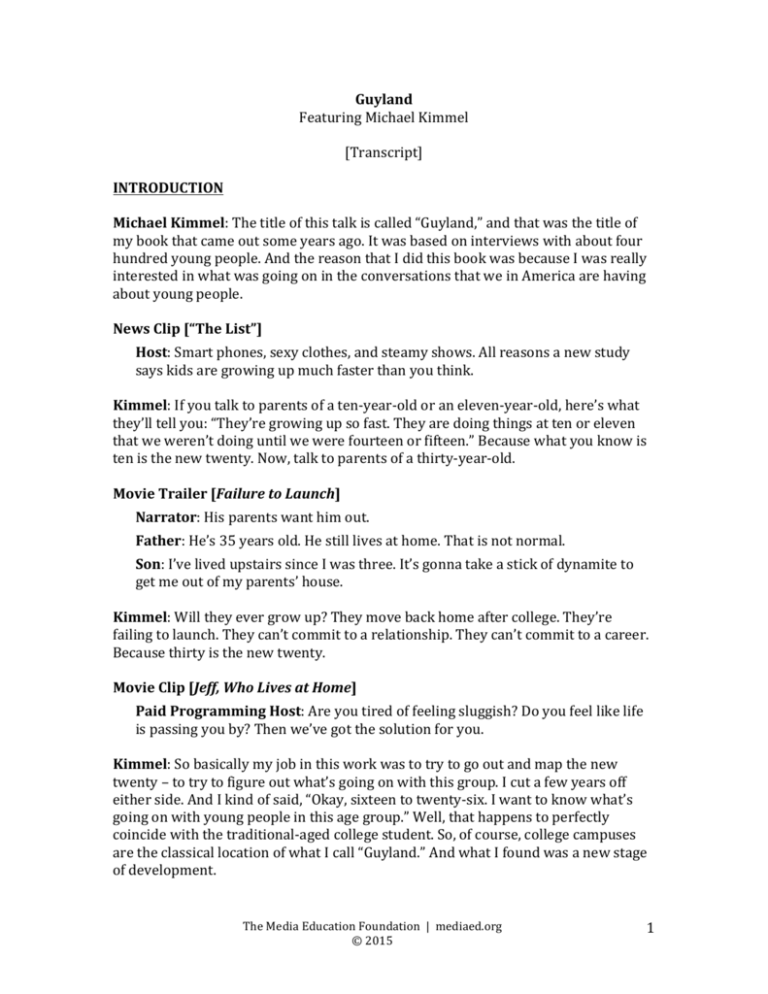
Guyland Featuring Michael Kimmel [Transcript] INTRODUCTION Michael Kimmel: The title of this talk is called “Guyland,” and that was the title of my book that came out some years ago. It was based on interviews with about four hundred young people. And the reason that I did this book was because I was really interested in what was going on in the conversations that we in America are having about young people. News Clip [“The List”] Host: Smart phones, sexy clothes, and steamy shows. All reasons a new study says kids are growing up much faster than you think. Kimmel: If you talk to parents of a ten-­‐year-­‐old or an eleven-­‐year-­‐old, here’s what they’ll tell you: “They’re growing up so fast. They are doing things at ten or eleven that we weren’t doing until we were fourteen or fifteen.” Because what you know is ten is the new twenty. Now, talk to parents of a thirty-­‐year-­‐old. Movie Trailer [Failure to Launch] Narrator: His parents want him out. Father: He’s 35 years old. He still lives at home. That is not normal. Son: I’ve lived upstairs since I was three. It’s gonna take a stick of dynamite to get me out of my parents’ house. Kimmel: Will they ever grow up? They move back home after college. They’re failing to launch. They can’t commit to a relationship. They can’t commit to a career. Because thirty is the new twenty. Movie Clip [Jeff, Who Lives at Home] Paid Programming Host: Are you tired of feeling sluggish? Do you feel like life is passing you by? Then we’ve got the solution for you. Kimmel: So basically my job in this work was to try to go out and map the new twenty – to try to figure out what’s going on with this group. I cut a few years off either side. And I kind of said, “Okay, sixteen to twenty-­‐six. I want to know what’s going on with young people in this age group.” Well, that happens to perfectly coincide with the traditional-­‐aged college student. So, of course, college campuses are the classical location of what I call “Guyland.” And what I found was a new stage of development. The Media Education Foundation | mediaed.org © 2015 1 PART ONE: “Adultolescence” Movie Clip [Ship of Fools] Old Man: How old are you? Young Woman: Sixteen. Old Man: Adolescence. What is adolescence? Adolescence is a time when people worry about things there’s no need to worry about. Michael Kimmel: In 1904, one of the country’s most famous social psychologists G. Stanley Hall wrote this amazing book. It was two volumes, sixteen hundred pages. And he says, you know, in the 19th century, Americans went directly from being children to being grown-­‐ups. Once you finished primary school, you went to work on the family farm. You apprenticed yourself out to some craftsman. Basically you were a grown-­‐up. But now, 1904, he says, something’s new. There’s a new stage of development in America in between childhood and adulthood. It’s a period of turmoil and confusion and not really knowing who you are. And he called that stage “adolescence.” He’s the guy who invented the word. Archive Video Clip Narrator: The years of adolescence can be unhappy years, frustrating years sometimes, a time of striving for things that seem impossible to achieve. Kimmel: But what he argued in that book was that by the time you hit eighteen, nineteen, let’s say twenty, you will have pretty much completed all of the five demographic markers of adulthood. You finish your education. You get married. You have a kid. You get a job. You move out of your parents’ house. Those are the big five. My mother completed all five of them within three months. She graduated from college in May, got married in June, immediately got pregnant with me, moved out of her family home into her marital home, and that September she started her first teaching job in the New York City public schools. And virtually none of you, of course, has completed all five of those. So something has happened in our culture that is now taking us almost a full decade longer to complete these five demographic markers. The average age of marriage in 1950 was around 21.3. Today it’s over 28.5. Forty percent of American college students will move back home after they graduate, and not just for the summer. And so this is true by the way for both women and men. The Media Education Foundation | mediaed.org © 2015 2 So there’s a new stage of development, and I’m not the only one who’s been thinking about this. There’s a whole school of psychology now that calls it “emerging adulthood.” Marketers on Madison Avenue, they call it “adultolescence.” There’s a new stage of development. Where did it come from? Why now? Why here? And most importantly, why won’t it go away? Text on Screen The First Cause of “Adultolescence” – Changes in Life Expectancy Kimmel: One of the major drivers, the first cause of this is simple demography. If you are a traditionally aged college student, the average age of death for you demographers tell us will be about ninety years old. Average age of death. So you might be sitting there thinking, “Get married at twenty? I don’t know if I want to be married to the same person for seventy years.” Movie Clip [Old School] Groomsman: All right, let me be the first to say congratulations to you then. You get one vagina for the rest of your life. Real smart, Frank. Way to work it through. Kimmel: You might say to yourself, “I want to play the field a little bit. I want to see what I’m like in relationships. What’s the rush?” Text on Screen The Second Cause of “Adultolescence” – Changes in the Economy Kimmel: The second thing that I think is pushing this is the economy. Movie Clip [Nightcrawler] Job Applicant: I’m looking for a job. In fact, I’ve made up my mind to find a career that I can learn and grow into. So what do you say? I could start tomorrow or even why not tonight. Boss: No. Kimmel: It is far harder today for young people entering the workforce to latch onto a career and follow a career path in a kind of linear way. Movie Clip [Nightcrawler] Job Applicant: How about an internship then? A lot of young people are taking unpaid positions to get a foot in the door. That’s something I’d be willing to do. Kimmel: My grandfather worked for the same company for forty-­‐five years. At the end of which he had a testimonial dinner, got a gold watch, and moved to a condo in Florida. Let me tell you, that’s not going to be your career trajectory. Most of you will The Media Education Foundation | mediaed.org © 2015 3 not only change jobs two or three times, you’ll change the entire field you work in two or three times during your career. In corporations, they talk about you experiencing what they call the three-­‐month itch. What happens is young people enter the workforce, and they realize after two or three months that they are not going to be CFO anytime soon. And so they leave, and they move on to another position, and then another one, engaging in what I came to call “serial jobogamy,” constantly moving laterally, horizontally, but not building a career ladder from one stage to the next. Text on Screen The Third Cause of “Adultolescence” – Changes in Parenting Kimmel: Now, the third thing that is producing it is changes in parenting. News Clip [Global National] Anchor: Parents will, of course, do anything for their children. But there’s news tonight that so-­‐called “helicopter parents,” parents who hover over their child’s every move, are doing more harm than good. Kimmel: Many of you have experienced first-­‐hand what we like to call “helicopter parents.” News Clip [Global National] Helicopter Mom: When we go to birthday parties, I walk around with them no matter where they go. Kimmel: Helicopter parents who micromanage every nanosecond of your life, taking you from trombone lessons to soccer practice to SAT prep classes, constantly hovering over you like helicopters. By the way, do you know what they call helicopter parents in Scandinavia? They call them “curling parents.” You know that sport called curling? Which basically consists of heaving a rock down a bowling alley made of ice, and then sliding in front of it to make sure its path is completely effortless, absolutely without resistance, completely smooth. That’s the curling parent. And what that has meant is that young people today are more risk-­‐averse and less resilient than previous generations. Now, you’ve been over-­‐parented as a generation, over-­‐parented throughout your high school lives, and now you come to college. It’s the gradual withdrawal of adults. When I was in college, we had these rules in our dorms. You were allowed to have members of the opposite sex in your room during the prescribed times. If, by the way, you had a member of the opposite sex in your room, you had to have three feet The Media Education Foundation | mediaed.org © 2015 4 on the floor at all times and the door had to be open the width of a book. Of course, those rules do not apply here any longer, do they? Video Montage [college students partying] Kimmel: Because what has happened here on college campuses, what we’ve witnessed is the gradual withdrawal of adults in the lives of young people. You are not nearly as policed, not nearly as scrutinized. Text on Screen The Fourth Cause of “Adultolescence” – Changes in Women’s Lives Archive Video Clip Women (chanting): What do we want? Equality! When do we want it? Now! Kimmel: There’s one more cause of this enormous change in our culture, and that’s the changes in women’s lives. And arguably, this is the single-­‐greatest change in our social life in the past fifty years. Archive Video Clip Women (chanting): Equal pay for equal work! Kimmel: The first thing: women made gender visible. We now know that gender is one of the organizing principles of social life. We now know that gender is one of the foundations, the building blocks, of your identity. Forty years ago, if you went to graduate school and said, “I want to study gender,” there was not one course you could take. Today, of course, there’s gender studies courses on every campus in the country. Archive Video Clip Narrator: She may be exclusively a homemaker… Kimmel: Second change in women’s lives over the past forty years has to do with the workplace. Archive Video Clip Narrator: Or she may hold a part-­‐time job… Kimmel: Women have entered the workplace in unprecedented numbers. Half the labor force is female. Archive Video Clip Narrator: Or she works in an office full-­‐time. The Media Education Foundation | mediaed.org © 2015 5 Kimmel: And that’s led to a third change in women’s lives, and that is the balance between work and family. Not that long ago, women thought that they had to choose between having careers and having family lives. Today, of course, women are unwilling to make that choice. Now, the fourth area of change in women’s lives is around sex. Movie Clip [The Graduate] Young Man: Mrs. Robinson, you’re trying to seduce me. (Woman laughs) Kimmel: This is by far the hardest one for us guys to wrap our heads around. Because we really thought the sexual revolution was all about us. Movie Clip [Shampoo] Young Woman: You wanna fuck? Video Montage [sexual revolution images] Kimmel: The sexual revolution promised more access to more partners with fewer commitments. Could you come up with a more masculine definition of a sexual revolution than that? Video Montage continues [sexual revolution images] Kimmel: But if you look at the mountain of sex research data that has been collected over the past thirty years or so, there’s only one conclusion you would come to. And that is it’s women’s sexuality that’s changed, not men’s. Television Clip [“Glee”] Young Woman: You wanna know a dirty little secret that none of them want you to know? Girls want sex just as much as guys do. Kimmel: Women today feel entitled to pleasure. Television Clip [“Glee”] Young Man: Is that accurate? Television Clip [“Saturday Night Live”] Young Woman (singing): We’re tired of sitting home while the guys have all the fun. Kimmel: Women know that they can like sex, want sex, go for it, get horny. The Media Education Foundation | mediaed.org © 2015 6 Television Clip [“The Last Man on Earth”] Woman: I’m horny. Man: Mmhmm. Woman: I’m so horny, Phil. Television Clip [“Girls”] Young Woman: Every time I have sex, it’s my choice. (She pushes a man onto her bed) Television Clip [“Girls”] Young Man: You wanted this. Young Woman: I wanted this so bad. Young Man: And now you’re finally getting it. Young Woman: Now I’m finally getting it. Television Clip [“Sex and the City”] Woman: Get back down there and make it up to me. Man: Awesome. Kimmel: Women have experienced finding their own sexual voice, their own sexual agency, are eager to express it. So these are four really interesting areas in which women’s lives have changed: identity, work, family, and intimacy. While women’s lives have changed so much, what’s been happening with men? Now, some of you are probably saying, “Not a whole lot.” I think that’s partly right. I think in some respects our lives have not changed. But in other respects they certainly have. My father went to an all-­‐male college, served in an all-­‐male military, and spent his entire working life in an all-­‐male work environment. That world is completely gone. None of the men in this room will have that kind of life. Our lives have changed a lot, but what has not changed is the ideology of masculinity: what we think it means to be a man. The Media Education Foundation | mediaed.org © 2015 7 PART TWO: Proving Your Masculinity Movie Clip [Blue Valentine] Man: What is it with this shit, being a man? What is that? What does it even mean? What does it mean? What does it mean to be a man? Don’t say it. Don’t say that stuff. Be a man, what is that shit? Michael Kimmel: One psychologist actually came up with what he called “the four basic rules of manhood.” So if any of the guys in here are having any doubts or questions, just memorize these, do them all the time, and you’ll be okay. Actually doing them all the time is actually really important. Text on Screen Rule #1 – No Sissy Stuff Kimmel: Number one. This is the number one rule. Please just get this right: No sissy stuff. Movie Clip [The Godfather] Man: Oh, Godfather. I don’t know what to do. I don’t know what to do. Godfather: You can act like a man! What’s the matter with you? What can I do? What can I do? Kimmel: You can never do anything that even remotely hints of femininity. Television Clip [“Empire”] Man: Are you out of your damn mind? Walking in here looking like a little bitch. Movie Clip [The Sandlot] Boy #1: You play ball like a girl! Kimmel: Your masculinity is the relentless repudiation of the feminine. That’s rule number one. Movie Clip [The Sandlot] Boy #2: What did you say? Boy #1: You heard me. Text on Screen Rule #2 – Be a Big Wheel Kimmel: Rule number two: Be a big wheel. We measure your masculinity by the size of your paycheck. The Media Education Foundation | mediaed.org © 2015 8 Movie Trailer [The Wolf of Wall Street] Man: My name is Jordan Belfort. The year I turned twenty-­‐six, I made forty-­‐nine million dollars, which really pissed me off because it was three shy of a million a week. Kimmel: Wealth, power, status… Movie Clip [Spring Breakers] Man: Look at my shit. I got shorts, every fucking color. I got designer t-­‐shirts. Kimmel: You ever see that bumper sticker: He who has the most toys when he dies wins. Text on Screen Rule #3 – Be a Sturdy Oak Movie Clip [Varsity Blues] Coach: What is this shit? Kimmel: Third rule: Be a sturdy oak. Movie Clip [Varsity Blues] Coach: Never show weakness. Never show weakness. Only pain that matters is the pain you inflict. Kimmel: What makes a man a man is that he is reliable in a crisis. What makes him reliable in a crisis is that he resembles an inanimate object. Movie Clip [The Boondock Saints II] Man #1: You think Duke Wayne spent all of his time talking about his feelings with a fucking therapist? Man #2: There’s no fucking way he did! Man #1: Real men hide their feelings. Why? Men (altogether): Because it’s none of your fucking business. Man #1: Men do not cry. Men do not pout. Men jack you in the fucking jaw and say… Hockey Player: Thanks for coming out. Text on Screen Rule #4 – Give ‘em Hell The Media Education Foundation | mediaed.org © 2015 9 Kimmel: And the fourth rule: Give ‘em hell. Movie Clip [Glory] Soldier: Give ‘em hell, 54th. (Soldiers cheer) Kimmel: Exude an aura of daring and aggression. Live life on the edge. Take risks. Go for it. Television Clip [“The Sopranos”] Man: No risk, no reward. Movie Trailer [Jackass 3] Kimmel: Those are the four basic rules of manhood. But now, I want to take you inside of Guyland, and I want to talk first about that first rule of manhood. Movie Clip [Hancock] Man #1: What springs to mind when you see this? Kimmel: The “no sissy stuff” rule. Movie Clip [Hancock] Man #2: Homo. Man #1: What about that? Man #2: Homo in red. Kimmel: That is how we prove our manhood to other guys. Movie Clip [Hancock] Man #2: Norwegian homo. Man #1: I’ll give you that. Kimmel: And it starts very early in our lives: That fear that other people will see us as not really manly. Movie Clip [Project X] Young Man: For you, you, me, Dax. Dax: Thank you. I don’t drink alcohol. Young Man: Okay, faggot. The Media Education Foundation | mediaed.org © 2015 10 Kimmel: You all know the number one putdown in every middle school, high school, and college campus today in the United States is “that’s so gay.” Movie Clip [Ted] Man: It just seems kinda gay, doesn’t it? Movie Clip [Fired Up!] Young Man: That’s not lame, bro. That’s gay. Movie Clip [Superbad] Young Man: Super gay. Movie Clip [21 Jump Street] Young Man: Turn that gay-­‐ass music off. Movie Clip [In Bruges] Man: One gay beer for my gay friend, and one normal beer for me because I am normal. Movie Clip [The Interview] Young Man: Liking Katy Perry and drinking margaritas is gay? Music Video Clip [Katy Perry – “Ur So Gay”] Perry (singing): You’re so gay and you don’t even like boys / No, you don’t even like / No, you don’t even like / No, you don’t even like boys Kimmel: And you also know “that’s so gay” really has nothing to do with sexual orientation, or so you’ll say. Movie Clip [The Dilemma] Man: Ladies and gentlemen, electric cars. They’re totally gay. It’s true. I don’t mean that they’re homosexual gay. But I do mean ‘your parents are the chaperone at the dance gay.’ Right? ‘You tuck it in and wear it real high gay.’ Kimmel: You’ll say, “No, it’s just wrong or stupid or dumb” or whatever, but it doesn’t really have to do with gay people. And I keep thinking, well isn’t that interesting? That it doesn’t attach to actual gay people. Could we say, “that’s so black” or “that’s so Jewish?” No, you couldn’t do that. But somehow it’s okay to say, “that’s so gay.” News Clip [“60 Minutes”] Anderson Cooper: Do you not like gay people? The Media Education Foundation | mediaed.org © 2015 11 Eminem: No, I don’t have any problem with nobody. You know what I mean? Like, I’m just whatever. Kimmel: Listen to the words of my favorite gender theorist in America, Eminem. Archive Video Clip Eminem: Faggot, to me, doesn’t necessarily mean gay people. Faggot, to me, just means… It’s taking away your manhood. You’re a sissy. You’re a coward. Kimmel: So you hear what he’s saying? It’s not about sexual orientation. It’s about gender. It’s about taking away your manhood. That fear of not being real men, of being seen as sissies or weak or gay, is one of the animating fears of American men, and it starts really early in our lives. Movie Clip [Boyhood] Boy #1: Don’t bump into me, little bitch. Boy #2: I didn’t. Boy #1: You calling me a liar? Boy #3: I don’t think pretty boy’s hair is good enough. Hey! Don’t touch me, faggot! Kimmel: Think guys about how much time and energy you spend policing yourself knowing that other people will be policing you. Movie Clip [The Perks of Being a Wallflower] Girl: Nice Trapper Keeper, faggot. Kimmel: How you walk, how you talk, how you move. Television Clip [“Friends”] Man: Has anyone seen my shirt? It’s a button-­‐down, like a faded salmon color. Woman: No. I haven’t seen your pink shirt. Television Clip [“That ‘70s Show”] Woman: Eric, were you playing in the bathtub with your little doll? Eric: Action figure! Movie Clip [Guardians of the Galaxy] Raccoon: I can’t believe you had that in your purse. Man: It’s not a purse. It’s a knapsack. The Media Education Foundation | mediaed.org © 2015 12 Movie Clip [The Hangover] Man #1: What? Your purse? Man #2: That’s not a purse. It’s a satchel. Television Clip [“Seinfeld”] Kramer: Yup. He’s a dandy. He’s a real fancy boy. Jerry: Maybe this isn’t my coat. Kramer: All right. All right. You’re not fancy. Man: No, he’s very fancy. Want me! Love me! Shower me with kisses! Kimmel: We learn how to be men by making that mistake once. Make it once and you correct yourself, you get a pass. Make it more than once, you are in trouble. You are a target. Movie Clip [The Grand Budapest Hotel] Man #1: Who’s Gustave H? Gustave H: I’m afraid that’s me, darling. Man #2: That fucking faggot! Kimmel: We learn this fear of being seen as unmanly, this fear of being seen as weak, as sissies. Movie Clip [The Grand Budapest Hotel] Man #2: You goddamn little fruit! Kimmel: This is what we take into our early college experiences and trying to prove our masculinity. Movie Clip [Animal House] Male College Student: (drinks bottle of alcohol) Thanks. I needed that. Kimmel: Now coming on to college campuses, eager, desperate to prove themselves as men… Movie Clip [21 & Over] Young Man: God! Dude, this campus is awesome! This is friggin’ awesome! Are you looking at this shit? This is beautiful. Kimmel: Really eager, having been so over-­‐parented, they come to college and now they’re ready to prove that they’re real men and that they are independent, autonomous. And what happens? The Media Education Foundation | mediaed.org © 2015 13 Movie Clip [Animal House] Fraternity Brother: Assume the position. Kimmel: We have on college campuses all kinds of groups that conduct what we might call rituals of initiation. Movie Clip [Animal House] Fraternity Pledge: (Gets spanked) Thank you, sir. May I have another? (Gets spanked) Thank you, sir. May I have another? (Gets spanked) Thank you, sir. May I have another? Kimmel: Now, let me just say something about this. Anthropologists will tell you there are hundreds of initiation rituals for young men, but there’s one difference. And you know what that one difference is? In other rituals where the young boys take on some task, go on a walkabout, perform some service, do something hard, difficult, dangerous, it is the adult men who conceive of the ritual, who plan it, who execute it, and who are there supervising it the entire time, and are there at the end to say, “You’ve made it. You’re okay.” So what you have on American college campuses is you have 18-­‐year-­‐old guys trying to prove their masculinity to 19-­‐year-­‐
old guys. Movie Clip [Neighbors] Fraternity Brother: You better eat this fucking dog food now. (Laughs) Kimmel: Only in the American college campus is that when the fraternity advisor says, “I know what you’re going to do this weekend. I can’t know about it.” That’s when the coach says, “I’m going on a recruiting trip. Don’t tell me.” That’s when the military advisor says, “I know what you’re going to do. I can’t know. I need plausible deniability.” Only then, that’s when the grown-­‐ups leave the scene. That cannot work. And that is why it becomes ritualistic. That’s why it becomes incessant. That’s why it becomes a kind of never-­‐ending saga. News Clip [CBS] Anchor: A case of fraternity hazing is being blamed for the death of a college student in California. Text on Screen 55% of college students involved in clubs, teams, and organizations experience hazing. News Clip [ABC] Anchor: An unofficial Air Force tradition getting out of hand. This year’s version ending with more than two dozen cadets hurt. The Media Education Foundation | mediaed.org © 2015 14 Text on Screen In 25% of hazing experiences, students believed coaches and/or advisors were aware of the activities. News Clip [ABC] Fraternity Pledge: I would come back to my room, and I would just lay on my bed and cry. Text on Screen Of those who labeled their experiences as hazing, 95% said they did not report the events to campus officials. New Clip [ABC] Fraternity Pledge: And through all this, I couldn’t tell a single soul what was going on. If I did so, I’d be considered a snitch. Kimmel: I was at a school and I was giving a talk, and the next morning I went into the snack bar and there were a couple of guys sitting around. So I said, “Do you go here? Could I ask you what it’s like to be…” and they were wearing fraternity sweatshirts. I said, “I’d love to know what kind of stuff you’re doing.” And one guy just said, “We’re doing something tonight. You want to come?” And I said, “What? What happened to all the secret handshakes and everything?” He said, “Oh, fuck it. Just come.” I said, “Okay.” So now, you have to imagine. I’m sitting in the corner scribbling notes while this is going on. Now, as I said, many of the things I write about I did not actually witness. This one I happened to have witnessed. Text on Screen 11:32 p.m. Kimmel: An anxious frivolity permeates the room as the brothers drink with the pledges. Most of the pledges are ready to puke. Movie Clip [22 Jump Street] Pledge #1: I’m gonna throw up. Pledge #2: I know. Shut up. Go. Text on Screen 1:18 a.m. The Media Education Foundation | mediaed.org © 2015 15 Kimmel: They’re then told to strip naked and stand in a straight line one behind the other. Movie Clip [21 & Over] Pledge: What? Kimmel: Each pledge is now ordered to reach his right hand between his legs to the pledge standing behind him and grab that guy’s penis, and then place his left hand on the shoulder of the guy in front of him. Movie Clip [Neighbors] Brother #1: Get back in line, Ass Juice! Brother #2: Get back in line! Pledge: I am not an elephant! Brother #2: What did you just say to me? Kimmel: That’s called “The Elephant Walk.” Text on Screen 3:44 a.m. Movie Clip [Old School] Brother #1: Congratulations, gentlemen. You should all be very proud of yourselves. Kimmel: The pledges stumble to the second-­‐floor balcony of the house. Movie Clip [Old School] Brother #2: At this point, you may be asking yourself, “Why am I holding this 30-­‐pound cinder block in my hands?” Kimmel: The brothers measure out lengths of rope, and a cinder block is tied to the end of each so that it touches the ground. The other ends of the ropes are tied to the base of each pledge’s penis. Movie Clip [Old School] Brother #2: Why is the other end of this string tied securely to your penis? Brother #1: And the answer, ladies, is trust. Kimmel: Why would guys do this? These are so obviously homoerotic rituals. Why would they put up with this? Why would guys put up with so much ritual humiliation? And here’s what I heard on every campus that I went to. Three simple words. The three simple words that define Guyland, and those words are… The Media Education Foundation | mediaed.org © 2015 16 Television Clip [“The Office”] Man: Bros before hos. Why? Because your bros are always there for you. They’ve got your back after your ho rips your heart out for no good reason. Kimmel: “Bros before hos” means two things. Number one: You get the brotherhood. Movie Clip [Henry V] Man: We few… Kimmel: Every fraternity guy knows one line of Shakespeare, and it’s from “Henry V.” Movie Clip [Henry V] Man: We band of brothers. For he today that sheds his blood with me shall be my brother… Kimmel: This idea of brotherhood, that notion of solidarity, is really important. And at the same time you get something else: You get hierarchy. Girls can’t do this. Movie Clip [Neighbors] Young Man: Bros before hos, right? Kimmel: You get vertical hierarchy and horizontal solidarity in the same moment. That’s what “bros before hos” means. Television Clip [“How I Met Your Mother”] Old Man: Bros before hos! Kimmel: Now, I want to talk about male-­‐female interaction, so I’m going to talk about heterosexuality and I’m going to talk about hooking up. The Media Education Foundation | mediaed.org © 2015 17 PART THREE: “Hooking Up & Gender Inequality” Television Clip [“American Horror Story”] Young Man: That’s all I ever wanted to do since I first saw you. Wanna hook up? Movie Clip [Mean Girls] Young Woman: Yes. Every Thursday, he thinks she’s doing SAT prep. But really, she’s hooking up with Shane Oman in the projection room above the auditorium. Television Clip [“It’s Always Sunny in Philadelphia”] Young Man: Today is a big day for me, Tommy. Tommy: Why? Young Man: Well, today is probably the best chance I’m ever gonna have of hooking up with this girl, so… (Tommy spits on him) Oh my God! Michael Kimmel: So here’s what we grown-­‐up researchers know about the hookup culture. Television Clip [“Gilmore Girls”] Young Woman: “Let’s hook up later.” What does that mean anyway? Kimmel: Here’s the first thing we know. The phrase itself “hooking up,” the term itself “hooking up,” really is deliberately vague. Television Clip [“The Big Bang Theory”] Young Woman #1: Raj told me that a while ago you two hooked up. Young Woman #2: I wouldn’t exactly call it a hookup. Kimmel: It can be anything from making out to intercourse. Television Clip [“The Big Bang Theory”] Young Woman #1: Did you kiss? Young Woman #2: Yeah. Young Woman #1: Were you naked? Young Woman #2: Yeah. Young Woman #1: So it was a hookup? Young Woman #2: No. (Pause) Yeah. Kimmel: Nobody really knows exactly what happens. This works for both his and her reputations. Because he will say, “I hooked up with Jessica.” And his bros will think, “Wow. He probably had intercourse with Jessica. He is a stud.” Jessica, on the The Media Education Foundation | mediaed.org © 2015 18 other hand, will add the magic word just, as in “I just hooked up with him.” So her friends will think, “She didn’t have intercourse. She is not a slut.” The second thing about hooking up that we found out: It’s also remarkably homosocial. Which is to say: He goes to the bar with a bunch of his guy friends; she goes to the bar with a bunch of her girl friends. There the two groups meet. At the end of the evening, around midnight, he says to her, “Can I walk you home?” That’s the beginning. Television Clip [“Man Seeking Woman”] Young Man: Thatta boy! Kimmel: And the third thing about it: It is almost always accompanied by copious amounts of alcohol. And this is not simply because people look sexier when you’re wearing beer goggles. But also because everybody wants plausible deniability for doing the very things that they seem to want to do in the first place. Let me add a couple of other things about hooking up. Television Clip [“Hello Ladies”] Young Woman: Do you ever wonder what this is? Young Man: This is two people having fun. Kimmel: After you’ve hooked up a couple of times, somebody has to initiate “the talk,” the DTR, define the relationship. Television Clip [“Hello Ladies”] Young Woman: You know, I was talking to my friend, and she was like, “Is he your boyfriend?” And I was like, “I don’t know.” Young Man: Mmhmm. Kimmel: 85% of the time, the DTR is initiated by women. And the guys all develop some kinds of strategies for evasion. Television Clip [“Hello Ladies”] Young Man: First of all, thank you for bringing this up. I hear everything you’re saying. And I understand, but… I think it’s dangerous to try to define it. We have to let this go where it wants to go. You know what I mean? Kimmel: Given that we know that hooking up is spontaneous, we develop strategies to avoid that conversation. Because once you’ve had “the talk,” it can’t be spontaneous anymore. I mean, you could do other things: You could be friends with benefits; you could be booty call; you could actually, I don’t know, date. But the one thing you can’t do is hook up. The Media Education Foundation | mediaed.org © 2015 19 Television Clip [“Hello Ladies”] Young Woman: Stay. You should stay. I just thought that we should have the conversation. Young Man: And I agree the conversation shouldn’t end. It should be ongoing. Kimmel: That is not gender equality. That is gender inequality. But let me even go further. We grown-­‐ups, we researchers, we were sitting around thinking, “How can we ask if they’re having good sex?” Television Clip [“True Blood”] Young Man: I hooked up with Maudette last night. We had sex. Man: How would you characterize the sex? Young Man: Uh… It was okay. Kimmel: Those of you who have encountered social scientists in the past, you know we can only think in four categories: a lot, some, a little, or nothing. And this is not going to offer you good data if I say, “How good was the sex? Great? Good? Eh? Terrible?” You’d get no useful data. What you need is some behavioral measure. So we came up with a behavioral measure. We asked them, “Did you have an orgasm at last hookup?” The first thing we found out is there’s an orgasm gap: 2/3 of the men and 1/3 of the women said, “Yes. I had an orgasm at last hookup.” We also asked, “Did your partner have an orgasm at last hookup?” And the women were spot-­‐on accurate: 2/3 of the women said, “Yes. My partner had an orgasm.” But the men dramatically overestimated the orgasms of their female partners… by a lot: Almost ¾ of the men said, “Yes. My partner had an orgasm at last hookup.” Remember, only 1/3 had. So this led us to do some interviews. And what we found out is that a large number of women said they were faking it. Movie Clip [When Harry Met Sally] Woman: Most women, at one time or another, have faked it. Man: Well, they haven’t faked it with me. Woman: How do you know? Kimmel: One woman said, “To make that person feel good, to make them feel like they’d done their job.” The Media Education Foundation | mediaed.org © 2015 20 Movie Clip [When Harry Met Sally] Woman: (Faking orgasm) Oh! Oh, God! Oh! Yes! Kimmel: Another woman said that she faked it, “Just really to end it because I was bored with it.” Movie Clip [When Harry Met Sally] Woman: (Faking orgasm) Oh! Oh yes! Kimmel: This is, I think, the most telling quotation in the entire book. She says, “He was trying so hard to make me come, and there was no way it was gonna happen. I felt so bad for him. I’d gone down on him and he came already, and he was trying to be a good sport about it. So I just faked it and he felt good and I felt relieved.” Movie Clip [American Pie] Young Woman: (Faking orgasm) I’m coming! Kimmel: She moves instead not from a position of sexual agency and autonomy but to rather taking care of his feelings. She moves from a fully sexually agentic person to a traditional feminine position. That is, in a sense, where women are in Guyland. And I want to tell you about one sorority ritual that illustrates this, I think really poignantly, called “Circle the Fat.” Any of you ever hear of this? This was written by a woman who participated in this in a magazine article. The pledges are stripped to their underwear and are blindfolded, and they lie facedown on the floor of the living room. And this is what she writes: “And that’s when the men entered the room, whistling and howling. The men circled us. I was becoming disoriented and felt nauseated. Something smelled toxic. Then something cold came in contact with my thigh. I gasped. ‘It’s okay, baby,’ said one of the men. ‘I’m just helping to make you look good.’” At that point, their blindfolds are taken off. And this woman writes: “There was a moment of confusion as each of us noticed that circles and X’s had been drawn on our bodies in permanent marker. These were areas ‘that needed some work,’ the pledge master said.” Could you find a more graphic, and I’m sorry for the pun, a more graphic illustration of gender inequality than that? Where the women are basically being told, “Here’s what you have to look like to please us.” The Media Education Foundation | mediaed.org © 2015 21 CONCLUSION Michael Kimmel: Now, what I’ve suggested to you tonight is that this new stage of development is characterized by two things: dramatic gender inequality; and the desire on the part of men to prove their masculinity. That is what characterizes Guyland. So the wrong question to have is, “How do we avoid this?” This is a new stage of development. You’re not going to avoid it. The right question, I believe, is, “How do I go through this new stage of development more consciously and more ethically?” [End] The Media Education Foundation | mediaed.org © 2015 22







